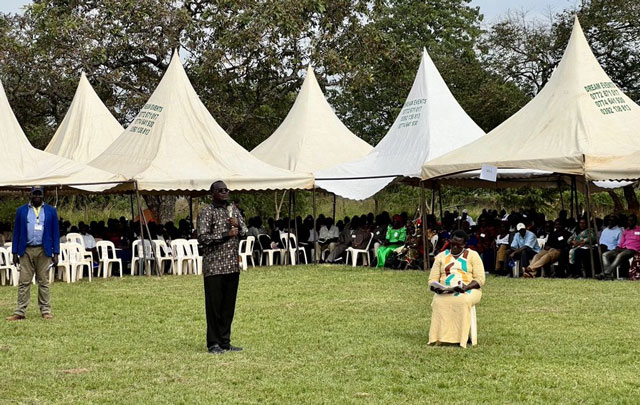
Gulu, Uganda | THE INDEPENDENT | Chief Justice Alfonse Owiny-Dollo Chigamoi has blamed the cases of famine and poverty among households in the Acholi Sub-region on extreme alcoholism coupled with laziness among abled men and women. Justice Owiny-Dollo notes that the majority of the abled-bodied Acholi community members have resorted to alcohol instead of engaging in productive ventures, a move that has left the sub-region featuring in national surveys as one of the poorest.
Justice Owiny-Dollo made the remarks Wednesday during the Pan-Acholi Convocation held at Sir Samuel Baker School in Gulu City. The Convocation attracted hundreds of members of the Acholi community who convened to discuss issues impeding development and find solutions for addressing the fundamental collapse of the Acholi society.
“…There is famine in Acholi because of these reasons and let me tell you, Alcohol has replaced households in Acholi, people here drink heavily including a ten-year-old child, a newly married woman, an 80-year-old woman during farming season,” Says Owiny-Dollo
Justice Owiny-Dollo also notes that laziness among the Acholi community has affected their abilities to engage in productive agricultural ventures adding that some farmers now rely on hired labor from neighboring Lango and West Nile.
Justice Owiny-Dollo says the current manifestation of famine, extreme poverty, and declining educational standards, and morals was unheard of in the Acholi Sub-region in the past. He says the convocation will help the various stakeholders in the sub-region to understand the origin of the current taboo and derive lasting solutions to the challenges.
To address the challenges of famine and low standard of education, Justice Owiny-Dollo tasked clan leaders in the Sub-region to draft bylaws that would see mandatory farming to address food insecurity and improve education.
Dr. Olara Otunnu, former Uganda People’s Congress (UPC) party president and one of the initiators of the Pan-Acholi convocation says the radical collapse of Acholi society manifests in both visible and invisible forms. He says that the visible forms of the societal collapse include poor education standards, extreme poverty, and declined agriculture while the Invisible involves the lost cultural identity, and lost sense of pride, among others.
Otunnu says with several leaders coming together to discuss the collapse of the Acholi society, they are hopeful, that solutions will be realized to address the challenges. A 16-member committee selected to investigate the fundamental collapse of the Acholi Society is expected to release their fact-finding reports today Thursday and offer road maps on how the problems can be addressed.
Acholi Sub-region witnessed spates of armed conflicts in the past including the longest two-decade rebellion waged by the Lord’s Resistance Army rebels that shattered the region’s economy, lives, and education leaving it one of the poorest in the country.
The 2019/2020 Uganda National Household Survey report conducted by the Uganda National Bureau of Statistics places the sub-region among the top poorest in the country, with the poverty rate standing at 68 percent, higher than the national estimate of 47 percent.
****
URN
 The Independent Uganda: You get the Truth we Pay the Price
The Independent Uganda: You get the Truth we Pay the Price





